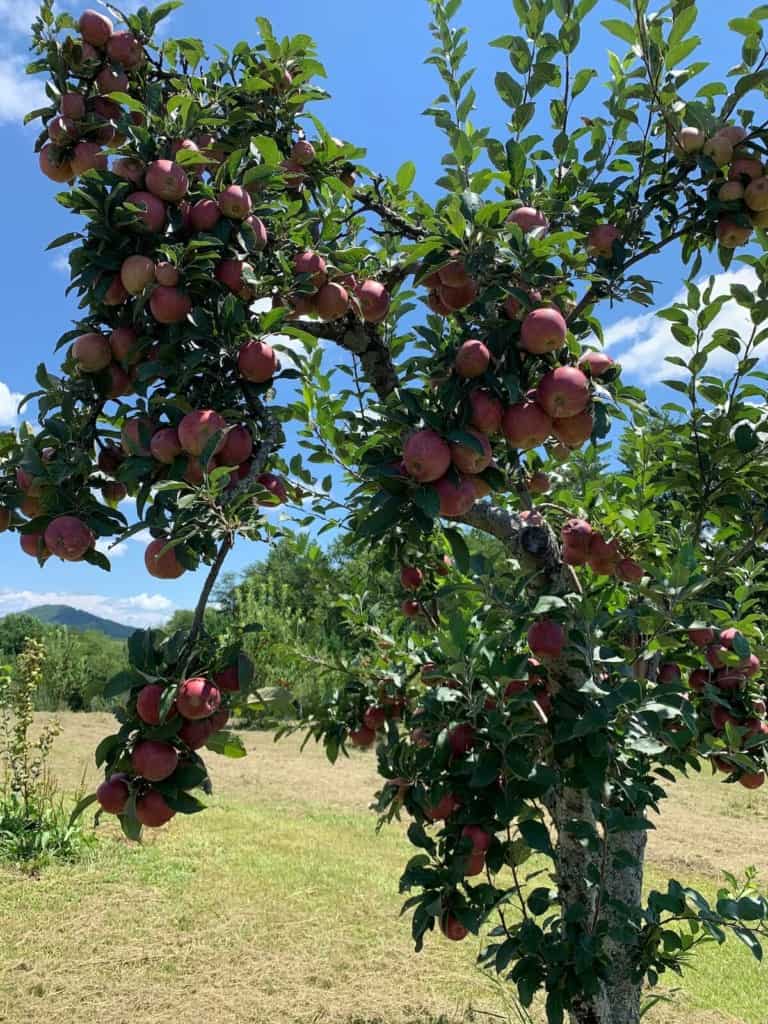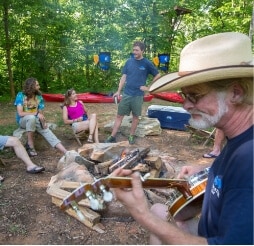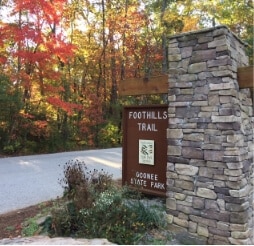Mountain grown fruit
Apples, peaches, grapes, berries and more
Apples are the largest crop produced in Long Creek, but the area is good for growing other fruit including: peaches, blueberries, grapes, arctic kiwi, figs, paw paws, pears and persimmons.
Each type of fruit ripens at different times depending on weather temperatures and amount of rainfall the area receives.
The 2025 apple season began early with trees producing fruit sooner than usual. Chattooga Belle Farm expects apple season to be over by late September this year.
So don’t wait, get yummy juicy Oconee County apples while you can!
Apple country
When you drive along Highway 76, through the rural community of Long Creek, it feels like you’ve traveled back to a time before sprawl and traffic took over the landscape. The northwestern corner of South Carolina is a mountainous region well suited to producing fruit. You’ll find rolling country and lush green trees as far as the eye can see. Look closer and notice trees loaded with apples!

You can find out more about the history of Oconee County’s apple industry by viewing the Oconee History Museum’s digital exhibit “WHY WE CELEBRATE: SC APPLE FESTIVAL”.
Over 100 years of apples
Long Creek & Mountain Rest were well known as “apple country”.
Newspaper articles name D.E. Good as the person who first established the apple industry beginning with his trees in 1909. By 1923, neighboring land owners saw his success and the industry really kicked off when more than 6,000 apple trees were planted.
Back in the day, there were 30+ orchards growing and harvesting apples from Westminster, SC to Clayton, GA. During the industry’s peak, there were twelve apple picking sheds and a large co-op known as the Long Creek Apple Marketing Authority where apples from multiple growers were stored and processed into cider.
For a time, the industry was made possible by a thriving migrant labor force. Each season growers would count on workers coming from Latin America to pick apples. Churches would help with child care and meals. Clemson Nursing and Wellness Center provided health screenings and temporary housing was available at various orchards.
By the 1960’s, Oconee was “all in” and became the largest apple producing area east of the Mississippi. In 1961, the mayor of Westminster, Cecil Sandifer, proposed the idea of hosting an Apple Festival to promote Oconee County apple growers. The idea took off, and the South Carolina Apple Festival continues to generate excitement and showcases one of our most beloved crops.
To find out more, read Why We Celebrate: SC Apple Festival.
The Decline
What happened? In the 1980’s weather was detrimental to the trees. Several seasons of late spring freeze occurred at the wrong time and killed apple blossoms, which meant trees didn’t produce fruit. Tree blight diseases, summer hail, lack of political subsidies and pressure from global markets all contributed to decline of the apple industry. Up until last year there were six orchards in production.
Fast forward to 2025: There are just two growers who work their fields, pick apples and sell to the public: Chattooga Belle Farm and Hollifield’s Orchard.
Roadside Market & You-Pick Orchard

Chattooga Belle Farm
454 Damascus Church Road
Long Creek, SC
(864) 647-976
200-acre farm growing apples, peaches, figs, grapes, blueberries and more (You-Pick or They-Picked). Jams, wines, farm raised Angus beef, speciality items and souvenir gifts
- Farm Store: 9am-5pm daily
- Belle’s Bistro: Wednesday-Sunday 11am-2pm
- Distillery: Monday-Saturday 10am-6pm

Hollifield’s Orchard
Hwy. 76
Across from Long Creek General Store
(864) 710-5105
Variety of apples, apple cider, peaches, homemade apple butter, apple cider vinegar, chow chow, relish, honey
Seasonal hours Labor Day till they run out of apples
Wondering what to do with all the apples you take home?
Here’s a link to one of our favorite recipes that calls for plenty of apples Apple Cake with Buttery Caramel Sauce. Yum!
Get Long Creek apples while the gettin’s good!
It’s a sad fact: The apple orchards in Long Creek won’t be around forever.
Warmer weather trends will likely cause temperatures to be too hot for growing within the next 5-10 years. The effort required to grow apples is hard, hot work. Being at the mercy of unpredictable weather patterns is stressful. And even when there is a great harvest season, it isn’t a lucrative business.
Over the past couple of years, orchard owners Mike Ables, Marvin Bryson, and Stanley Brewer have retired. And Doug Hollifield says the 2025 season will be his last. These orchard owners took over family apple businesses when their fathers retired. But their own kids didn’t follow in their footsteps. Their offspring have careers where they make more money and don’t have to work long hot days doing physical labor. Attracting buyers to take over these orchards isn’t likely.
Unfortunately when orchard growers retire, and their trees are no longer sprayed or picked, the ineveitable next step is to bulldoze the apple trees.
You may wonder: Why would they bulldoze the trees?
Because when apple trees go untended and the fruit is unpicked, it falls to the ground. The amount of rotting apples on hundreds of acres leads to diseases and attract pests that could infest surrounding orchards. It is common practice for orchard growers to resort to this management technique when they stop harvesting apples.
On the bright side…Chattooga Belle Farm, is relatively new on the scene and plans to remain in business for years to come!


Fun Fact: Bees are the secret
Bees are essential for large scale fruit production.
Orchard growers rely on bees to pollinate apple and peach trees in the spring. Honey is the fruit of bees’ labor.









